Next Generation 02:
The ITOCHU Group’s CSV
Sustainable Development through Dole Philippines’ Harmonious Coexistence with Surrounding Regions
“Pineapples over Antigovernment Activities”
In 2013, we acquired the Asian fresh produce and worldwide packaged foods businesses of the Dole Food Company, one of the world’s largest companies involved in fresh produce. Production volume had been falling in these businesses due to negative factors such as natural disasters in the Philippines, the largest production hub. However, by utilizing our financial resources and placing employees on site and in positions of management, we have turned around production volume and earning capacity. At present, we are working to increase production capacity and are aiming to become Asia’s largest integrator of agricultural products.
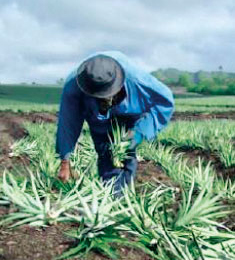
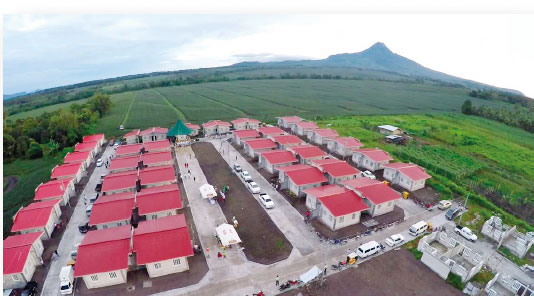
The history of Dole Philippines’ pineapple division (Dolefil) dates back to 1963, when the Dole Food Company settled on the island of Mindanao in the Philippines. Dolefil was conducting a labor-intensive pineapple production in a region where the business infrastructure was underdeveloped. For this reason, Dolefil consistently focused on harmonious coexistence with the region and has achieved sustained business development for more than half a century. For example, pineapple cultivation requires a fixed period of financial commitment (one cycle for every three years). To lower barriers to entry and support the stability of the cultivation business, we make offers to farmers, including loans for initial expenses, sharing of expertise regarding improving production efficiency, and purchase of harvested pineapples. We also run a program to build homes for employees who earned high scores based on such factors as their years of service and work attitude. This program is one example of how we link lifestyle infrastructure support with productivity.
Dolefil is conducting farm management in a region in which the public order is destabilized by armed anti-government forces. Regardless, no Company assets have been damaged by these forces, which is the strongest evidence of the mutual trust Dolefil has built with the region.
Strong Industry Clusters
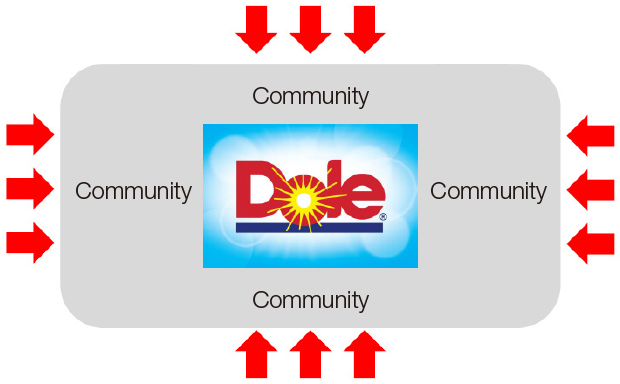
Dolefil’s “Social Fence” is both an initiative that integrates social contribution and growth strategies and a concept whereby a region protects its businesses. Dolefil is forming strong industry clusters* in the region with wide-ranging initiatives conducted in collaboration with regional governments and Mahintana Foundation, Inc. (below, MFI), an NGO spun out by Dolefil’s CSR department. These initiatives include industry and employment creation, environmental protection and forest restoration, education, livelihood support, employee benefits, and health and safety.
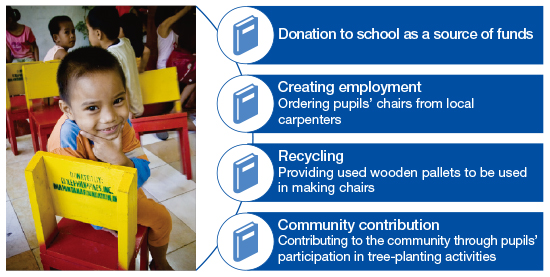
For example, we are conducting ongoing donations to regional schools. We accomplish this by deducting five pesos per month from employee salaries and, with supplementation from Dolefil and the labor union, securing monetary figures that are five times the deducted amounts.
These figures serve as a source of funds for our school donations. Additionally, using the money from donations to order pupils’ chairs from local carpenters creates employment. We also offer used pallets as lumber for the chairs, contributing to raw material recycling. In exchange for these donations, Dolefil is, among other initiatives, expanding participation in regional contribution by calling for children to take part in afforestation efforts. By ordering saplings for reforestation from local vendors, Dolefil creates a cycle of employment creation.
We are also creating a cycle of initiatives targeting environmental conservation. Dolefil and MFI are spearheading the Ridge to Reef Project, which aims to protect marine resources by safeguarding rivers and controlling sediment runoff. This large project also involves regional governments, local businesses, and clients. A portion of the donations for this project are used to support local nursery suppliers in seedling cultivation and procurement. This approach helps fulfill seedling demand for Dolefil’s afforestation efforts and also contributes to creating employment for regional citizens.
* Industry cluster: A condition created when the main constituents of a specific industry accumulate geographically. Professor Michael E. Porter, a US business scholar, proposes “creating industry clusters that support the regions in which companies place their bases” as one of three CSV approaches.
Dolefil CSV Compatible with “Sampo Yoshi”
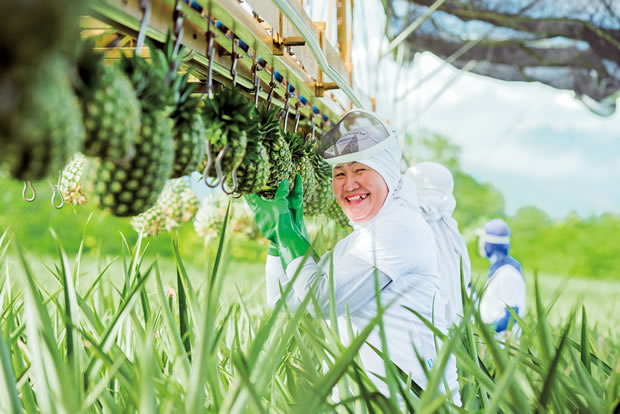
In 2018, MFI was praised for its operational social contributions and commended as the number-one NGO in the Philippines. Additionally, the Department of Labor and Employment has named MFI the top-performing company in a separate contest twice in a row, in 2015 and 2017. The department holds this contest every two years and commends companies that possess superior relationships with their employees.
Dolefil synergy with the local municipality in the city of Polomolok, where it places its headquarters, has made the city the sixth most competitive municipality in the Philippines, as well as the most competitive on the island of Mindanao. The mayor of Polomolok released a statement saying, “Dole is Polomolok, Polomolok is Dole.” As this statement shows, Dolefil has been acknowledged as a company deeply rooted in the region.
Dolefil’s policies for creating shared values (CSV) expand the scope of the Social Fence by creating local employment and improving the livelihoods of local citizens. In this way, they are compatible with ITOCHU’s “sampo yoshi” philosophy, which supports business sustainability and raises productivity and quality. We are increasing Dole’s sustainable corporate value by supporting these approaches through the provision of various functions.

